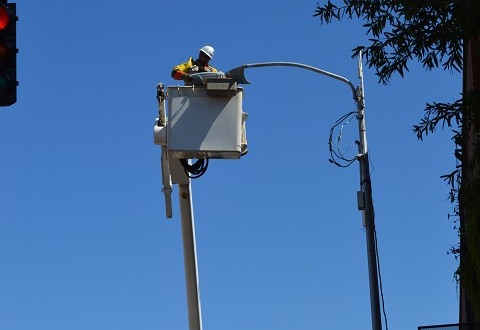Residents and shoppers in the City of Greer’s downtown district, commonly known as Greer Station, are seeing streetscapes and businesses more clearly thanks to the installation of light-emitting diode (LED) streetlights in place of high-pressure sodium (HPS) fixtures.
The joint lighting partnership between Greer Commission of Public Works (CPW) and the City of Greer is part of the 2015 Greer Community Master Plan that calls for ways to protect the environment, grow the local economy and promote Greer Station. The Greer Gateway Lighting Project replaced 128 HPS streetlights with aesthetically pleasing and eco-friendly LED fixtures.
“The difference is very noticeable. It’s exactly the type of cost-effective and energy-efficient upgrade called for in the Greer Community Master Plan,” Greer City Administrator Ed Driggers said. “City residents and visitors will be excited to know that this is simply the first step of beautification and infrastructure improvements in Greer Station in keeping with the community master plan.”
The City of Greer purchased the fixtures, which emit clear light versus the yellow light from HPS fixtures, and will save nearly $5,000 per year in operating costs. Greer CPW installed all of the new fixtures. The two entities plan to partner again in 2017 to replace HPS fixtures on Highway 29 (Wade Hampton Blvd.) in the city to accomplish another goal of the community master plan.
“This is a great project for Greer. Among the many advantages of the LED lamp technology are that they have extremely long lives, they don’t have filaments that can burn out quickly and they don’t contain toxic chemicals like mercury, unlike traditional high-pressure sodium lamps or mercury-vapor lamps. So far, I have received nothing but positive feedback and am very pleased with the quality of the lighting project,” said Perry Williams, Greer Commission Chairman.
Last month CPW Commissioners approved new outdoor lighting rates introducing LED fixtures as the new standard for all outdoor lighting installed after November 1.
“The new lights will help transform the look and feel of the community, while reducing outdoor lighting rates for our customers,” Williams said.
According to Energy Star, LED lights can be more efficient, durable, versatile and longer lasting than normal bulbs. They also provide a great way to save money in businesses and homes when used for a number of years.
“Changing to efficient lighting is a simple way to make a major difference for both the environment and operational costs,” Mayor Rick Danner said. “The city received a $48,000 federal grant in 2010 that made possible a lighting retrofit at the City Operations Center which houses our Parks and Recreation Department and Public Services Department. Lighting in the warehouse and office areas was retrofitted or replaced with energy efficient fixtures and bulbs, including occupancy sensors that regulate lighting based on need.”
Just as fixtures have gradually been replaced in other city facilities, Greer CPW has worked to become environmentally sound in its daily operations.
“We believe this lighting project underscores our commitment to the environment and customers. Currently, more than 90% of the power enjoyed by our customers is carbon-free and CPW hosts one of the area’s few compressed natural gas (CNG) fueling stations and a large alternatively-fueled CNG fleet of vehicles. We hope this lighting improvement will be enjoyed for many years to come,” said Jeff Tuttle, Greer CPW General Manager.
QUICK FACTS:
• (120) 100-watt HPS lights replaced with 60- watt LED = $4,400 savings/yr
• (8) 400-watt HPS flood lights replaced with 209- watt LED = $630 savings/ yr
• Lights were replaced along Poinsett St. and Main St. from Wade Hampton Blvd. to Downtown Greer
• The life expectancy of an LED light fixture is 10 years or more
• New 60-watt LED fixtures installed downtown will consume 55% less energy than HPS fixtures
• All standard street and rental lights installed by CPW after November 1 will be LED
• CPW customers may request to change to LED for a $50 transition fee
• CPW is actively looking at other energy efficient programs center around residential and commercial lighting

